-
 Bitcoin
Bitcoin $82,817.8607
0.37% -
 Ethereum
Ethereum $1,786.3450
-0.21% -
 Tether USDt
Tether USDt $0.9995
-0.03% -
 XRP
XRP $2.0581
2.05% -
 BNB
BNB $588.2756
-0.68% -
 USDC
USDC $0.9998
0.00% -
 Solana
Solana $115.3483
0.38% -
 Dogecoin
Dogecoin $0.1636
2.68% -
 TRON
TRON $0.2386
2.84% -
 Cardano
Cardano $0.6358
-0.31% -
 UNUS SED LEO
UNUS SED LEO $9.3782
-0.39% -
 Toncoin
Toncoin $3.3861
-6.95% -
 Chainlink
Chainlink $12.5471
-1.04% -
 Stellar
Stellar $0.2562
0.24% -
 Avalanche
Avalanche $17.9826
0.03% -
 Shiba Inu
Shiba Inu $0.0...01210
0.63% -
 Sui
Sui $2.1798
-1.97% -
 Hedera
Hedera $0.1599
1.32% -
 Polkadot
Polkadot $4.0300
3.14% -
 Litecoin
Litecoin $82.4348
0.50% -
 MANTRA
MANTRA $6.2928
-0.26% -
 Bitcoin Cash
Bitcoin Cash $298.4903
-1.02% -
 Bitget Token
Bitget Token $4.4895
-0.77% -
 Dai
Dai $1.0000
0.00% -
 Ethena USDe
Ethena USDe $0.9995
-0.01% -
 Monero
Monero $215.3108
0.00% -
 Hyperliquid
Hyperliquid $11.2063
-1.26% -
 Uniswap
Uniswap $5.7675
-1.15% -
 Pi
Pi $0.5200
-14.33% -
 NEAR Protocol
NEAR Protocol $2.4551
3.63%
How to choose a reliable mining pool?
Choose a reliable mining pool by evaluating hashrate, fees, transparency, server location, payment methods, and support to maximize profits and minimize risks.
Apr 02, 2025 at 02:56 am
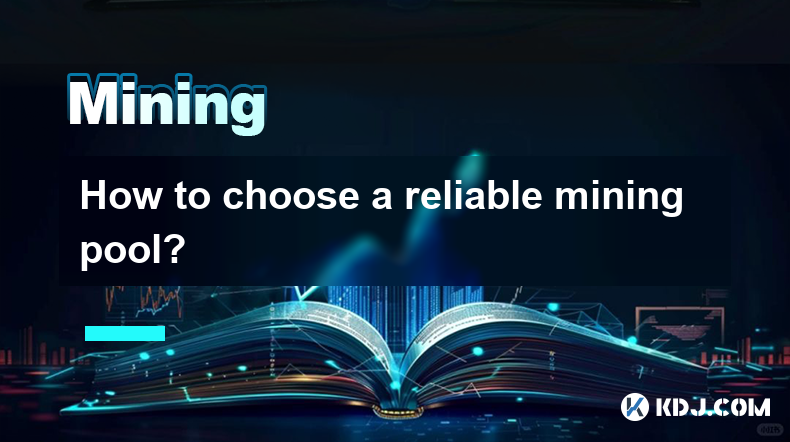
How to Choose a Reliable Mining Pool
Understanding the Importance of Choosing the Right Mining Pool
Mining cryptocurrency requires significant computational power. Joining a mining pool allows you to combine your hashing power with others, increasing your chances of successfully mining a block and earning rewards. However, not all mining pools are created equal. Selecting a reliable pool is crucial for maximizing your profits and minimizing risks. A poor choice can lead to lower payouts, instability, and even potential scams. Therefore, careful consideration of several key factors is paramount.
Key Factors to Consider When Selecting a Mining Pool
Choosing the right mining pool involves evaluating several crucial aspects. These aspects directly impact your profitability and overall mining experience. Ignoring these factors could lead to significant losses and frustration.
Hashrate and Pool Size: A larger pool generally offers more frequent payouts due to a higher probability of solving blocks. However, extremely large pools can also lead to higher competition and potentially lower individual rewards. Find a balance that suits your hashing power. Consider the pool's hashrate relative to the total network hashrate. A significant portion, but not dominance, is ideal.
Payout System and Fees: Different pools employ various payout methods, such as PPS (Pay Per Share), PPLNS (Pay Per Last N Shares), and others. Each system has its advantages and disadvantages regarding risk and reward. Carefully analyze the fee structure; high fees can significantly eat into your profits. Compare fee percentages across different pools.
Transparency and Reputation: Choose a pool with a transparent operational history. Look for pools with publicly available data on their hashrate, payouts, and block solutions. Check online reviews and forums for feedback from other miners. Avoid pools with a history of questionable practices or negative reputation.
Server Location and Infrastructure: The pool's server location and infrastructure directly affect the stability and latency of your connection. A geographically closer pool usually provides better connectivity and reduced latency, leading to more efficient mining. Choose a pool with robust infrastructure and multiple server locations for redundancy.
Payment Methods and Speed: Confirm the pool supports your preferred payment method and the frequency of payouts. Faster payout speeds are beneficial, but prioritize reliability over speed. Check the pool's history of timely payments.
Software and Support: A user-friendly interface and readily available support are essential. Look for pools with comprehensive documentation and responsive customer support. A reliable pool will offer assistance when needed.
Understanding Different Payout Systems
The payout system significantly impacts your mining profitability and risk tolerance. Understanding the nuances of each system is critical for making an informed decision.
PPS (Pay Per Share): You receive payment for every share submitted, regardless of whether the pool finds a block. This system provides consistent income but involves higher pool fees to compensate for the guaranteed payouts.
PPLNS (Pay Per Last N Shares): You are paid based on your contribution to the last N shares that resulted in a block discovery. This system is riskier but potentially more profitable if the pool finds blocks frequently.
FPPS (Full Pay Per Share): This is a variation of PPS where the pool covers the cost of unsuccessful shares. It offers consistent income but usually comes with higher fees.
PROP (Proportional): This system distributes rewards proportionally to the amount of work each miner contributes. The payout is directly related to your hashrate and the pool's success in finding blocks.
Beyond the Basics: Additional Considerations
While the above factors are paramount, other aspects can contribute to a positive mining experience.
Pool's Cryptocurrency Support: Ensure the pool supports the specific cryptocurrency you want to mine. Some pools specialize in particular coins.
Mining Software Compatibility: Check if the pool's software is compatible with your mining hardware and operating system.
Security Measures: A reputable pool will employ robust security measures to protect your data and prevent unauthorized access.
Frequently Asked Questions
Q: What happens if I choose an unreliable mining pool?
A: Choosing an unreliable mining pool can lead to several negative consequences, including delayed or unpaid rewards, data breaches, and even complete loss of your investment.
Q: How often should I check my mining pool's performance?
A: Regularly monitoring your mining pool's performance is crucial. Check your payouts, hashrate, and the pool's overall status at least daily to ensure everything is running smoothly.
Q: Can I switch mining pools easily?
A: Yes, you can usually switch mining pools relatively easily. However, there might be a short delay while your mining software adjusts to the new pool's configuration.
Q: Are there any free mining pools?
A: While some pools might advertise themselves as "free," they often have high fees or other hidden costs that ultimately reduce your profitability. It's essential to thoroughly examine the fee structure before joining any pool.
Q: What is the best mining pool?
A: There's no single "best" mining pool. The ideal pool depends on your individual needs and preferences, including your hashrate, preferred payment method, and risk tolerance. Thoroughly research different pools before making a decision.
Q: How can I verify the legitimacy of a mining pool?
A: Verify a mining pool's legitimacy by checking online reviews, examining its public transparency reports, and verifying its operational history. Look for evidence of consistent payouts and a positive reputation among other miners.
Disclaimer:info@kdj.com
The information provided is not trading advice. kdj.com does not assume any responsibility for any investments made based on the information provided in this article. Cryptocurrencies are highly volatile and it is highly recommended that you invest with caution after thorough research!
If you believe that the content used on this website infringes your copyright, please contact us immediately (info@kdj.com) and we will delete it promptly.
- Dogecoin Price Soared Over 2% Today, Indicating a Renewed Market Interest in the Leading Meme Coin
- 2025-04-04 21:10:12
- Filecoin FIL $2.76 24h volatility: 2.9% Market cap: $1.79 B Vol. 24h: $489.77 M
- 2025-04-04 21:10:12
- The latest Dogecoin price prediction is raising eyebrows
- 2025-04-04 21:05:12
- With meme coins like Pepe and Shiba Inu back in the spotlight, traders are wondering which token could deliver the biggest gains this week
- 2025-04-04 21:05:12
- Market expert Ali Martinez estimates that the price of this dog-themed meme coin has the potential to surge by around 250% to touch the $0.5 level
- 2025-04-04 21:00:12
- Ethereum (ETH) price plunges further as investors limit their risk exposure
- 2025-04-04 21:00:12
Related knowledge
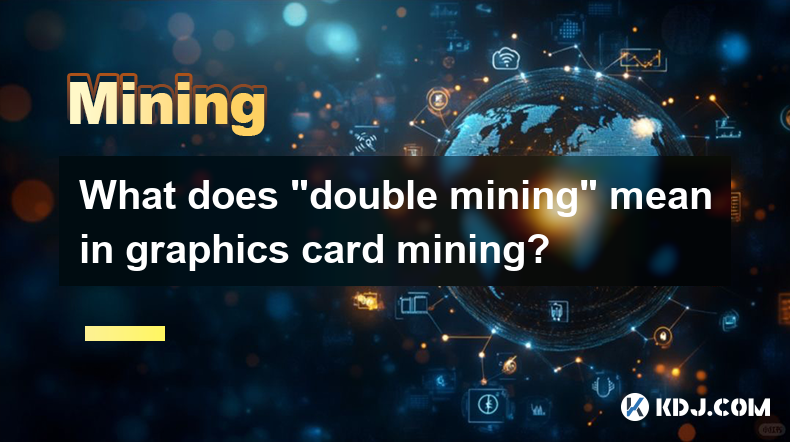
What does "double mining" mean in graphics card mining?
Apr 04,2025 at 08:35pm
In the world of cryptocurrency, the term 'double mining' refers to a specific technique used in graphics card mining to maximize the efficiency and profitability of mining operations. This method involves simultaneously mining two different cryptocurrencies using the same graphics card. The concept of double mining has gained popularity among miners who...

What is the market prospect of CPU mining currency?
Apr 04,2025 at 09:14am
The concept of CPU mining currency has gained traction in the cryptocurrency community due to its accessibility and potential for decentralization. Unlike GPU or ASIC mining, which often requires significant investment in specialized hardware, CPU mining can be performed using standard computer processors. This makes it an attractive option for individu...
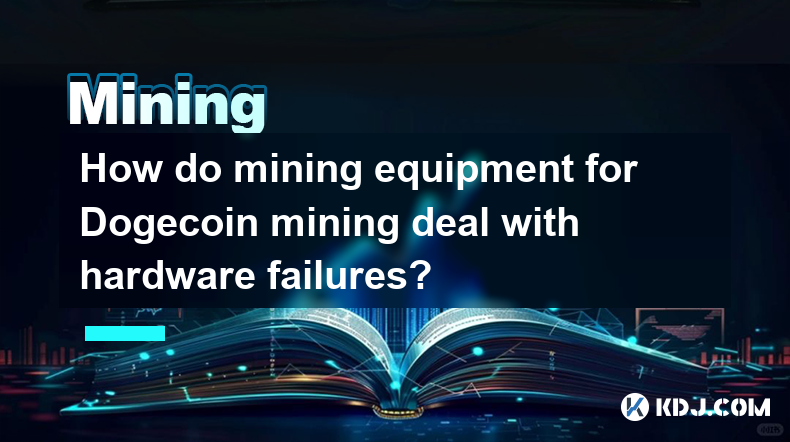
How do mining equipment for Dogecoin mining deal with hardware failures?
Apr 03,2025 at 09:15am
Dogecoin mining, like other forms of cryptocurrency mining, relies heavily on specialized hardware to perform the necessary computations to mine new coins. However, as with any technology, mining equipment can encounter hardware failures. This article will explore how mining equipment for Dogecoin mining deals with such failures, covering various aspect...
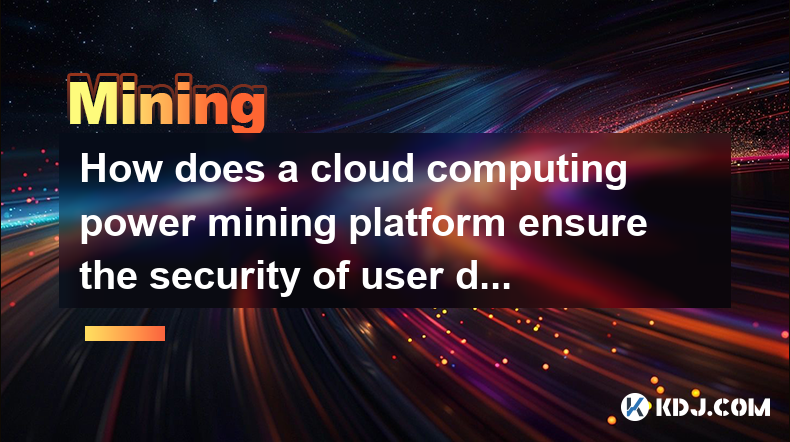
How does a cloud computing power mining platform ensure the security of user data?
Apr 04,2025 at 01:14am
In the realm of cryptocurrency, cloud computing power mining platforms have emerged as a popular solution for individuals and companies looking to mine digital assets without the need for expensive hardware. However, with the increasing use of these platforms, the security of user data has become a critical concern. This article delves into the various ...
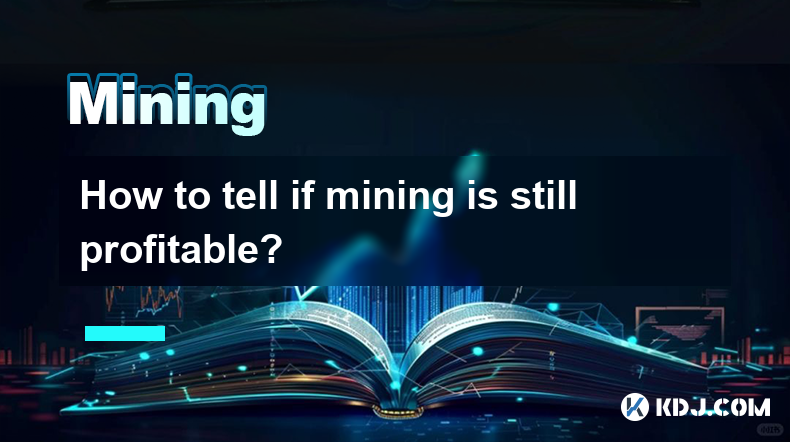
How to tell if mining is still profitable?
Apr 03,2025 at 01:56pm
Determining whether cryptocurrency mining remains profitable involves assessing several key factors. Miners must consider the costs of electricity, the efficiency of their mining hardware, the current market price of the cryptocurrency being mined, and the mining difficulty. Electricity costs can vary significantly by location, and high costs can quickl...
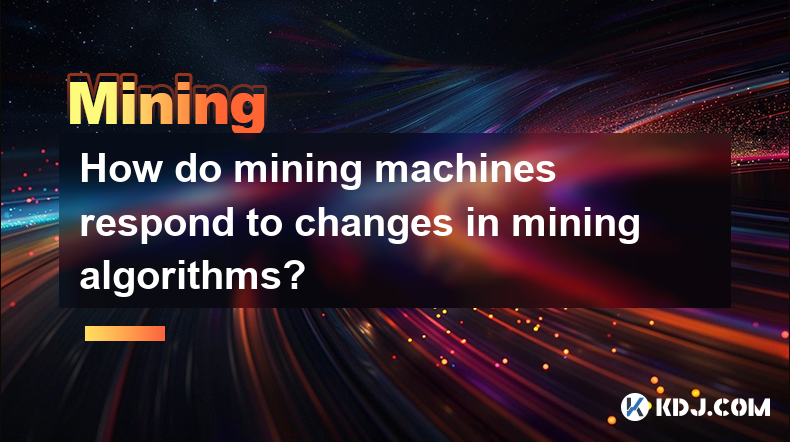
How do mining machines respond to changes in mining algorithms?
Apr 03,2025 at 07:07am
Mining machines are essential components of the cryptocurrency ecosystem, particularly for Proof of Work (PoW) blockchains like Bitcoin. These machines are designed to solve complex mathematical problems to validate transactions and add them to the blockchain. However, the algorithms that govern these mining processes can change, impacting the efficienc...

What does "double mining" mean in graphics card mining?
Apr 04,2025 at 08:35pm
In the world of cryptocurrency, the term 'double mining' refers to a specific technique used in graphics card mining to maximize the efficiency and profitability of mining operations. This method involves simultaneously mining two different cryptocurrencies using the same graphics card. The concept of double mining has gained popularity among miners who...

What is the market prospect of CPU mining currency?
Apr 04,2025 at 09:14am
The concept of CPU mining currency has gained traction in the cryptocurrency community due to its accessibility and potential for decentralization. Unlike GPU or ASIC mining, which often requires significant investment in specialized hardware, CPU mining can be performed using standard computer processors. This makes it an attractive option for individu...

How do mining equipment for Dogecoin mining deal with hardware failures?
Apr 03,2025 at 09:15am
Dogecoin mining, like other forms of cryptocurrency mining, relies heavily on specialized hardware to perform the necessary computations to mine new coins. However, as with any technology, mining equipment can encounter hardware failures. This article will explore how mining equipment for Dogecoin mining deals with such failures, covering various aspect...

How does a cloud computing power mining platform ensure the security of user data?
Apr 04,2025 at 01:14am
In the realm of cryptocurrency, cloud computing power mining platforms have emerged as a popular solution for individuals and companies looking to mine digital assets without the need for expensive hardware. However, with the increasing use of these platforms, the security of user data has become a critical concern. This article delves into the various ...

How to tell if mining is still profitable?
Apr 03,2025 at 01:56pm
Determining whether cryptocurrency mining remains profitable involves assessing several key factors. Miners must consider the costs of electricity, the efficiency of their mining hardware, the current market price of the cryptocurrency being mined, and the mining difficulty. Electricity costs can vary significantly by location, and high costs can quickl...

How do mining machines respond to changes in mining algorithms?
Apr 03,2025 at 07:07am
Mining machines are essential components of the cryptocurrency ecosystem, particularly for Proof of Work (PoW) blockchains like Bitcoin. These machines are designed to solve complex mathematical problems to validate transactions and add them to the blockchain. However, the algorithms that govern these mining processes can change, impacting the efficienc...
See all articles




















































































